Text

Top DevOps Service Providers
DevOps service providers play a crucial role in modern software development by bridging the gap between development and operations teams, streamlining processes, and fostering a culture of collaboration and innovation. These providers offer a range of services aimed at optimizing software delivery pipelines, enhancing deployment automation, and improving overall system reliability and performance.
Key aspects of DevOps services provided by these providers include:
DevOps Consulting: Offering strategic guidance and expertise in implementing DevOps practices tailored to the specific needs and goals of organizations.
Continuous Integration/Continuous Deployment (CI/CD): Designing and implementing CI/CD pipelines to automate the build, test, and deployment processes, ensuring rapid and reliable delivery of software.
Cloud Infrastructure Management: Leveraging cloud technologies to design, deploy, and manage scalable and cost-effective infrastructure solutions, optimizing resource utilization and performance.
Automation: Implementing automation tools and frameworks to streamline repetitive tasks, improve efficiency, and reduce manual errors across the development and operations lifecycle.
Monitoring and Logging: Setting up robust monitoring and logging systems to track performance metrics, detect issues proactively, and ensure the stability and availability of systems.
Security Integration: Integrating security practices into the DevOps workflow, implementing security controls, and conducting regular audits to ensure compliance and protect against threats.
Collaboration and Culture Building: Promoting a collaborative culture within organizations by fostering communication, knowledge sharing, and cross-functional teamwork between development, operations, and other stakeholders.
DevOps service providers play a pivotal role in helping businesses accelerate their software delivery, improve agility, and achieve greater efficiency and quality in their IT operations. By leveraging best practices, tools, and expertise, these providers enable organizations to stay competitive in today's fast-paced and dynamic digital landscape.
#devops#tech#innovation#automation#cloud#digitaltransformation#agile#softwaredevelopment#collaboration#ITservices#techtweek
0 notes
Text
Top cloud company in India
Cloud computing has become an integral part of modern business operations, providing companies with the flexibility and scalability they need to stay competitive in today's fast-paced digital landscape. As one of India's top cloud services providers, Azure API Management offers businesses a comprehensive Cloud Computing platform that includes Cloud Infrastructure, Azure API Management, and a wide range of other services to meet their unique needs. With a proven track record of delivering high-quality cloud solutions to clients across various industries, Azure API Management is the go-to choice for companies looking to harness the power of the cloud for their business. Explore how Azure API Management stands out as the top cloud company in India and how it can help transform your business operations for the better.
#cloudinfrastructure#digitaltransformation#cloudcomputing#itinfrastructure#datacenter#hybridcloud#iaas#paas#saas#cloudsecurity#scalability#datamanagement#cloudservices#cloudmigration#techinnovation
0 notes
Text
The Ultimate DevOps Solutions: Leading Provider in India

In today's fast-paced and competitive business landscape, organizations constantly strive for efficiency and agility. One popular approach to achieving these goals is by adopting a DevOps methodology. DevOps, which combines software development (Dev) and IT operations (Ops), emphasizes collaboration, automation, and continuous delivery. It allows businesses to streamline their software development lifecycle, reduce deployment time, and improve overall product quality. At Techtweek Infotech, we understand the importance of DevOps in driving business success. With our best-in-class DevOps service providers in India, we help organizations navigate the complexities of software development and operations, empowering them to deliver high-quality products faster and more efficiently than ever before.
0 notes
Text
Unlocking Efficiency and Innovation: Exploring Cloud Computing Platforms and Services
In today's digital age, businesses and organizations are embracing the power of cloud computing to streamline operations, drive innovation, and enhance scalability. Cloud computing platforms offer a wide range of services that cater to diverse needs, from hosting simple websites to running complex data analytics algorithms. Let's delve into the world of cloud computing platforms and explore the key services they provide.
Infrastructure as a Service (IaaS): At the core of cloud computing platforms is Infrastructure as a Service (IaaS), which provides virtualized computing resources over the internet. With IaaS, businesses can access and manage servers, storage, networking, and other infrastructure components on a pay-as-you-go basis. Popular IaaS providers include Amazon Web Services (AWS), Microsoft Azure, and Google Cloud Platform (GCP).
Platform as a Service (PaaS): PaaS offerings go a step further by providing a complete development and deployment environment in the cloud. Developers can leverage PaaS services to build, test, and deploy applications without worrying about underlying infrastructure management. PaaS providers often include tools and frameworks for application development, database management, and scalability.
Software as a Service (SaaS): SaaS is perhaps the most well-known cloud computing service model, delivering software applications over the internet on a subscription basis. Users can access SaaS applications directly through a web browser, eliminating the need for local installation and maintenance. Examples of SaaS applications range from email services like Gmail to productivity suites like Microsoft 365.
Containerization and Microservices: Cloud platforms also offer support for containerization technologies like Docker and Kubernetes, enabling developers to package applications and dependencies into lightweight, portable containers. This approach promotes scalability, agility, and efficient resource utilization. Microservices architecture further enhances cloud applications by breaking them down into smaller, independent services that can be developed, deployed, and scaled individually.
Serverless Computing: A newer paradigm gaining traction is serverless computing, where cloud providers manage the underlying infrastructure and automatically scale resources based on demand. Developers can focus on writing code (functions) without worrying about servers or provisioning. Serverless computing offers cost savings, faster time-to-market, and seamless scalability for event-driven applications.
Big Data and Analytics: Cloud computing platforms provide robust tools and services for big data storage, processing, and analytics. Businesses can leverage services like Amazon Redshift, Google BigQuery, or Azure Synapse Analytics to derive insights from massive datasets, perform real-time analytics, and build machine learning models.
Security and Compliance: Cloud providers prioritize security and compliance, offering a range of tools and services to protect data, applications, and infrastructure. Features such as encryption, identity and access management (IAM), and compliance certifications ensure that businesses can meet regulatory requirements and maintain data confidentiality.
Hybrid and Multi-Cloud Solutions: Many organizations adopt hybrid and multi-cloud strategies, combining on-premises infrastructure with cloud services from multiple providers. This approach offers flexibility, resilience, and the ability to leverage the strengths of different cloud platforms for specific workloads or use cases.
Key Takeaways:
Cloud computing platforms offer a range of services including IaaS, PaaS, and SaaS to meet diverse business needs.
Containerization, serverless computing, and microservices enhance scalability, agility, and resource efficiency.
Big data analytics, security, and compliance are integral aspects of cloud computing platforms.
Hybrid and multi-cloud strategies provide flexibility and resilience for modern IT environments.
In conclusion, cloud computing platforms continue to revolutionize the way businesses operate, enabling them to innovate, scale, and stay competitive in a rapidly evolving digital landscape. Embracing the full suite of cloud services can unlock efficiencies, drive growth, and empower organizations to achieve their goals.
0 notes
Text
In essence, DevOps empowers modern businesses to innovate faster, deliver higher-quality products and services, respond quickly to customer needs, and stay competitive in today’s dynamic market landscape.
Unlock the full potential of your software development with our expert DevOps Consulting Services — building efficiency, reliability, and innovation into every project!
0 notes
Text

Advanced Cybersecurity Solutions for Modern Challenges
In today's interconnected world, safeguarding your digital assets is paramount. Our cybersecurity solutions services offer a comprehensive suite of tools and strategies to protect your organization from evolving cyber threats. From threat detection and prevention to incident response and recovery, we ensure that your digital fortress remains secure at all times.
Our team of cybersecurity experts employs cutting-edge technologies and industry best practices to assess vulnerabilities, identify potential risks, and implement robust security measures tailored to your specific needs. We offer a range of services including network security, endpoint protection, data encryption, penetration testing, and security awareness training.
With cyber-attacks becoming more sophisticated and frequent, partnering with us gives you peace of mind of knowing that your sensitive data, intellectual property, and critical infrastructure are shielded from malicious actors. Stay ahead of the curve and fortify your defenses with our proactive cybersecurity solutions services.
0 notes
Text
Local SEO (Search Engine Optimization) for small businesses is a crucial digital marketing strategy aimed at improving the online visibility and presence of local businesses within their target geographic areas. This approach focuses on optimizing various aspects of a business's online presence to ensure higher rankings in local search results, particularly on search engines like Google, Bing, and Yahoo.
One key aspect of local SEO is ensuring that the business's website is properly optimized for local keywords, including location-specific terms that potential customers are likely to use when searching for products or services in their area. This optimization involves incorporating these keywords strategically into the website's content, meta tags, headings, and URLs.
Additionally, local SEO for small businesses involves optimizing their Google My Business (GMB) listing. This includes updating accurate business information such as name, address, phone number (NAP), business hours, and adding high-quality images. Encouraging positive reviews from satisfied customers and responding to reviews promptly can also boost the business's credibility and visibility in local search results.
0 notes
Text
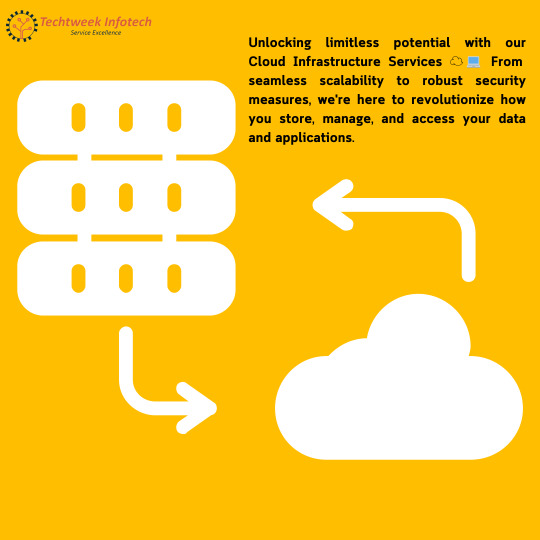
Choosing the Right Cloud Infrastructure Services Provider In Mohali
Choosing the right cloud infrastructure services provider in Mohali can significantly impact the success and efficiency of your business operations. With many options available, it’s crucial to consider several key factors to make an informed decision.
Firstly, consider the scalability offered by the provider. Ensure they can accommodate your business’s growth without compromising performance. Next, prioritize security measures such as data encryption, regular audits, and compliance certifications to safeguard sensitive information.
Reliability is another critical aspect. Choose a provider with a proven track record of uptime and minimal downtime to ensure uninterrupted access to your cloud services. Additionally, evaluate the provider’s performance metrics and Service Level Agreements (SLAs) to guarantee optimal performance levels.
Cost-effectiveness is also vital. Compare pricing structures and consider factors like storage, bandwidth, and additional services included in the package.
Ultimately, by carefully assessing these factors and aligning them with your business needs, you can choose the right cloud infrastructure services provider in Mohali for seamless operations and future growth.
#cloudservices#scalability#security#efficiency#innovation#cloudcomputing#datamanagement#digitaltransformation#technology#businesssolutions#cloudstorage#cloudsecurity#cloudnetworking#cloudsolutions#cloudmigration
0 notes
Text
What security measures should be implemented in a cloud infrastructure to protect sensitive data?
Several security measures should be implemented to protect sensitive data in a cloud infrastructure. These measures help ensure data confidentiality, integrity, and availability, safeguarding against unauthorized access, data breaches, and other security threats. Here are some key security measures for cloud infrastructure services:
1. **Encryption:** Utilize encryption techniques such as TLS (Transport Layer Security) for data in transit and AES (Advanced Encryption Standard) for data at rest. This ensures that data remains secure even if intercepted or accessed without authorization.

2. **Access Control:** Implement strict access control policies and mechanisms, such as Role-Based Access Control (RBAC) or attribute-based access control (ABAC), to manage and enforce permissions for users, applications, and resources based on their roles and responsibilities.
3. **Multi-Factor Authentication (MFA):** Require users to authenticate using multiple factors, such as passwords, biometrics, or security tokens, to add an extra layer of security and prevent unauthorized access to cloud services and data.
4. **Network Security:** Deploy firewalls, intrusion detection and prevention systems (IDPS), and virtual private networks (VPNs) to secure the network infrastructure, monitor traffic, and detect and block malicious activities and unauthorized access attempts.
5. **Data Loss Prevention (DLP):** Implement DLP solutions to monitor, detect, and prevent the unauthorized transfer, sharing, or leakage of sensitive data within the cloud environment. This includes identifying and blocking attempts to upload or download sensitive data to unauthorized locations.
6. **Regular Audits and Monitoring:** Conduct regular security audits, vulnerability assessments, and penetration testing to identify and remediate security gaps and vulnerabilities in the cloud infrastructure. Use security monitoring tools to detect and respond to security incidents in real time.
7. **Secure APIs:** If using APIs (Application Programming Interfaces) for cloud services integration, ensure that APIs are secure by implementing authentication, authorization, and encryption mechanisms to protect data exchanged between applications and cloud services.
8. **Data Backup and Recovery:** Implement robust data backup and recovery mechanisms to ensure data availability and integrity in case of data loss, corruption, or ransomware attacks. Backup data regularly and store backups securely in geographically dispersed locations.
9. **Compliance and Governance:** Adhere to industry regulations, standards, and compliance requirements relevant to your organization and the data stored or processed in the cloud. Implement governance policies, procedures, and controls to ensure compliance and mitigate risks.
10. **Employee Training and Awareness:** Conduct regular security training and awareness programs for employees to educate them about security best practices, phishing attacks, social engineering tactics, and the importance of safeguarding sensitive data in the cloud.
0 notes
Text
Some key reasons why DevOps is crucial for large organizations
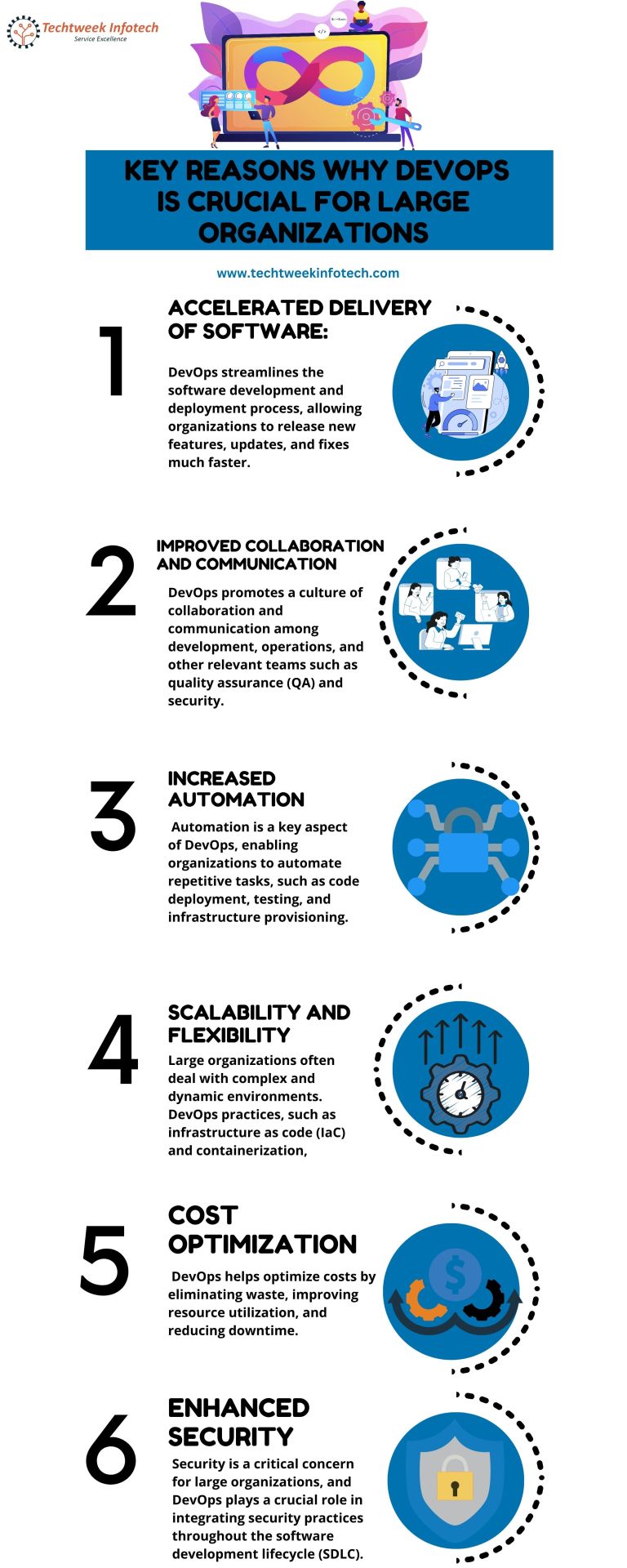
DevOps, which stands for Development and Operations, is a set of practices and principles to improve collaboration and communication between software development and IT operations teams. The importance of DevOps for large organizations cannot be overstated, as it brings several significant benefits that directly impact business performance and agility. Here are some key reasons why DevOps is crucial for large organizations:
Accelerated Delivery of Software: DevOps streamlines the software development and deployment process, allowing organizations to release new features, updates, and fixes much faster. This speed is essential in today's competitive landscape, where businesses need to respond quickly to market demands and customer feedback.
Improved Collaboration and Communication: DevOps promotes collaboration and communication among development, operations, and other relevant teams such as quality assurance (QA) and security. This alignment ensures that everyone is working towards common goals, reduces silos, and enhances efficiency across the organization.
Enhanced Quality and Reliability: By integrating continuous testing, monitoring, and feedback loops into the development process, DevOps helps improve the quality and reliability of software products. Issues can be identified and addressed early in the development cycle, leading to more stable and resilient applications.
Increased Automation: Automation is a key aspect of DevOps, enabling organizations to automate repetitive tasks, such as code deployment, testing, and infrastructure provisioning. Automation reduces human errors, speeds up processes, and frees up teams to focus on higher-value activities.
Scalability and Flexibility: Large organizations often deal with complex and dynamic environments. DevOps practices, such as infrastructure as code (IaC) and containerization, facilitate scalability and flexibility by allowing for rapid provisioning, deployment, and management of resources across different environments (e.g., development, testing, production).
Cost Optimization: DevOps helps optimize costs by eliminating waste, improving resource utilization, and reducing downtime. By streamlining processes and fostering a culture of continuous improvement, organizations can achieve better ROI on their technology investments.
Enhanced Security: Security is a critical concern for large organizations, and DevOps plays a crucial role in integrating security practices throughout the software development lifecycle (SDLC). DevSecOps, an extension of DevOps, focuses on integrating security principles and tools into DevOps processes, leading to more secure applications and faster incident response.
Agility and Innovation: DevOps enables organizations to be more agile and innovative by promoting iterative development, rapid experimentation, and quick adaptation to changing market conditions. This agility is essential for staying competitive and meeting evolving customer needs.
Large organizations can successfully scale DevOps initiatives, improve collaboration, accelerate delivery, and achieve greater agility and innovation. For more insights on DevOps methodology and best practices, check out our new blog on DevOps methodology and process.
0 notes
Text
Unlocking Agility: A Comprehensive Guide to DevOps Methodology
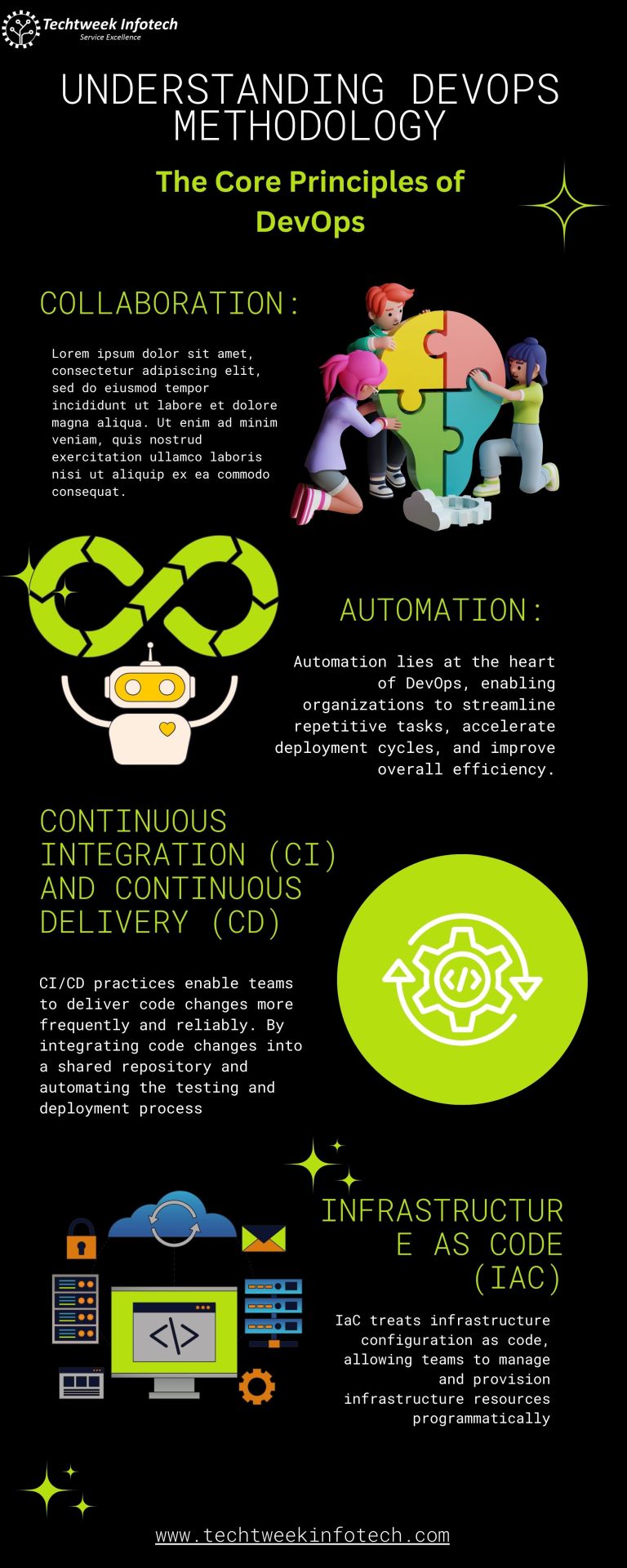
Discover the transformative power of DevOps in our comprehensive guide, exploring its principles, practices, and implementation strategies. From collaboration and automation to accelerating time to market and cost optimization, delve deep into how DevOps revolutionizes software development. Learn about the cultural shift, toolchain selection, skills development, and incremental adoption that drive success. Embrace DevOps to unlock agility, efficiency, and competitiveness in today's dynamic digital landscape. Partner with expert DevOps consulting services for effective implementation and accelerate your journey towards faster innovation and enhanced customer experiences.
Click here for more information on Exploring DevOps: Methodology and Process
0 notes
Text
Exploring Cloud Infrastructure Services

Cloud infrastructure services encompass a range of vital components in the digital realm. These services provide the foundational backbone for hosting applications, storing data, and managing computing resources in the cloud. From virtual servers and storage solutions to networking capabilities and scalable computing power, cloud infrastructure services empower businesses to streamline operations, enhance flexibility, and scale efficiently. With features like on-demand provisioning, pay-as-you-go pricing models, and robust security measures, cloud infrastructure services are instrumental in driving innovation and accelerating digital transformation across industries.
0 notes
Text
Exploring Essential Tools for Continuous Integration in DevOps

In the realm of DevOps, continuous integration (CI) plays a pivotal role in streamlining software development processes. Discover the essential tools that empower teams to automate builds, run tests efficiently, and integrate code seamlessly. From popular CI/CD platforms like Jenkins and GitLab CI to robust testing frameworks like Selenium and JUnit, this comprehensive guide dives deep into the tools that drive continuous integration in DevOps workflows.
Are you navigating the complexities of DevOps testing? Dive into our comprehensive guide on testing in DevOps, where we explore the critical role of continuous integration in ensuring software quality and reliability. Discover the latest tools and best practices that empower teams to automate testing, streamline workflows, and achieve faster, more reliable releases.
#devops#continuousintegration#ci#cd#softwaredevelopment#automation#testing#jenkins#gitlabci#selenium#junit#devopstesting#softwarequality#workflowautomation#releasemanagement#development#technology#innovation
0 notes
Text
Key Benefits of Our Local SEO Services
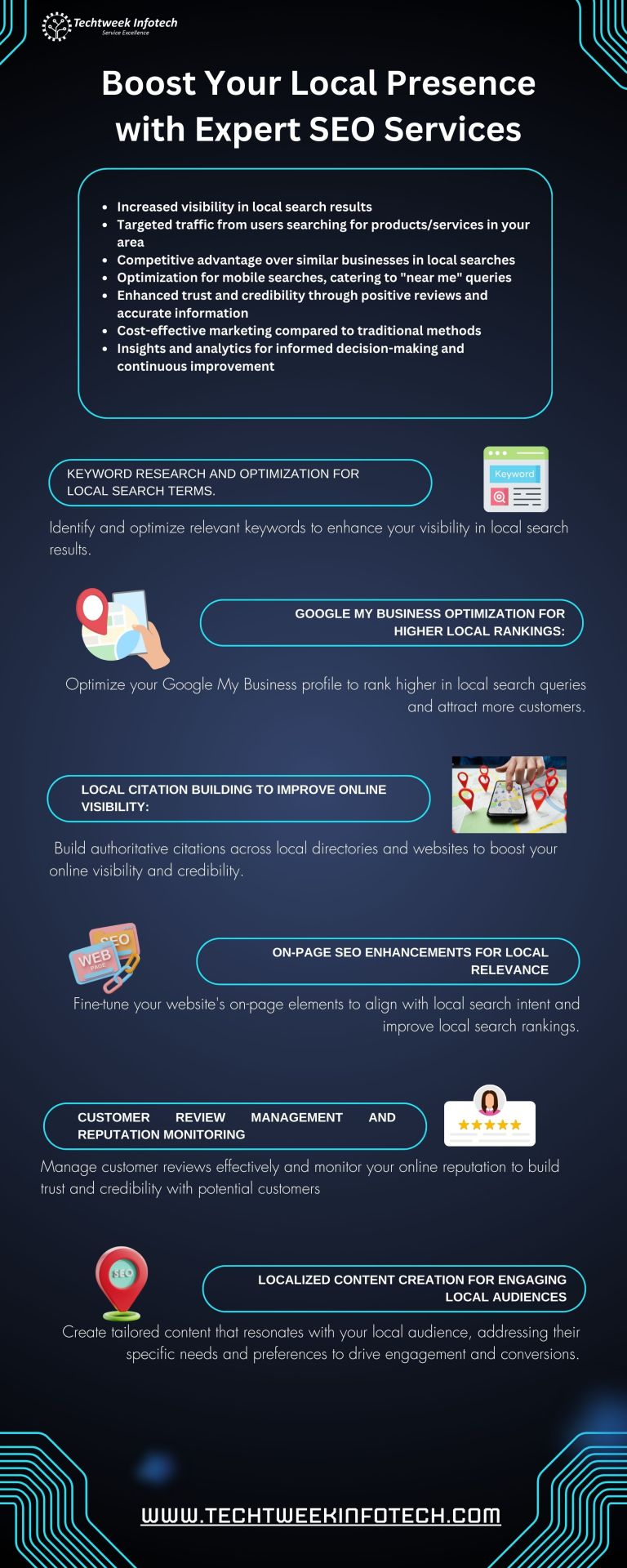
Keyword research and optimization for local search terms: Identify and optimize relevant keywords to enhance your visibility in local search results.
Google My Business optimization for higher local rankings: Optimize your Google My Business profile to rank higher in local search queries and attract more customers.
Local citation building to improve online visibility: Build authoritative citations across local directories and websites to boost your online visibility and credibility.
On-page SEO enhancements for local relevance: Fine-tune your website's on-page elements to align with local search intent and improve local search rankings.
Customer review management and reputation monitoring: Manage customer reviews effectively and monitor your online reputation to build trust and credibility with potential customers.
Localized content creation for engaging local audiences: Create tailored content that resonates with your local audience, addressing their specific needs and preferences to drive engagement and conversions.
Empower your small business with targeted visibility and increased customer engagement through our expert Local SEO services. Let us help you stand out in your local market and drive growth like never before.
0 notes
Text
Security considerations in DevOps pipelines
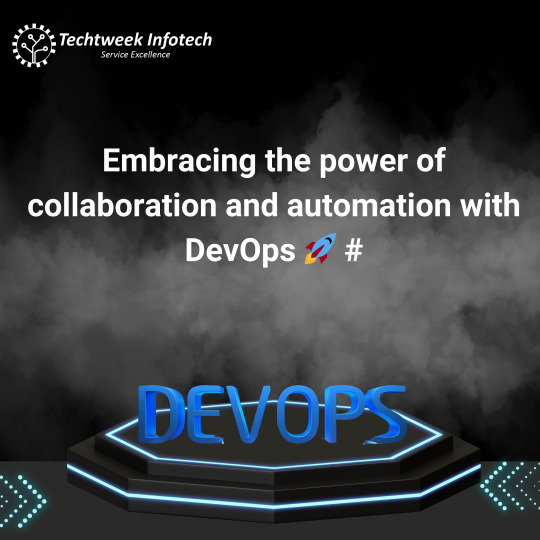
DevOps" refers to a set of practices aimed at improving collaboration and communication between development (Dev) and operations (Ops) teams to deliver high-quality software faster and more efficiently. In the context of DevOps pipelines, which are automated workflows for software delivery, security considerations play a crucial role in ensuring the integrity, confidentiality, and availability of the software being developed and deployed.
Effective DevOps pipelines integrate security practices throughout the software development lifecycle (SDLC), from code inception to production deployment. This includes:
Continuous Integration (CI): Integrate security checks into the CI process to identify and remediate vulnerabilities early in the development cycle. Automated code analysis tools can scan for known security issues, coding best practices, and compliance requirements.
Continuous Delivery/Continuous Deployment (CD): Implement security gates in the CD pipeline to validate the integrity of artifacts before deployment. This includes static and dynamic application security testing (SAST/DAST), container security scans, and infrastructure-as-code (IaC) security checks.
Infrastructure Security: Leverage infrastructure automation tools (e.g., Terraform, Ansible) securely. Apply least privilege principles, use secrets management solutions (e.g., HashiCorp Vault, AWS Secrets Manager), and regularly audit infrastructure configurations for security compliance.
Secure Configuration Management: Ensure that all components, including third-party libraries and dependencies, are up to date with security patches. Use dependency scanning tools to detect and mitigate vulnerabilities in software dependencies.
Monitoring and Incident Response: Implement robust logging, monitoring, and alerting mechanisms to detect and respond to security incidents promptly. Utilize security information and event management (SIEM) tools to centralize security logs for analysis and threat detection.
Collaboration with DevOps Services Providers: Engage with DevOps services providers who specialize in implementing secure DevOps practices. These providers offer expertise in designing, implementing, and managing DevOps pipelines with a strong focus on security.
0 notes
Text
Importance of Cloud Computing for Small Businesses
In today’s competitive landscape, small businesses face numerous challenges, including limited resources and budget constraints. Cloud computing emerges as a game-changer, offering many benefits that empower small businesses to thrive. Here’s why cloud computing is indispensable for small businesses:

Scalability: Cloud computing allows small businesses to scale their operations seamlessly. Whether experiencing rapid growth or seasonal fluctuations, cloud services can adapt to varying demands without the need for extensive infrastructure investments. This scalability ensures that businesses can efficiently manage their resources and accommodate evolving needs.
Flexibility: With cloud computing, small businesses gain unparalleled flexibility in managing their IT infrastructure. They can easily access resources such as storage, computing power, and software applications on-demand, enabling agility in responding to market dynamics and customer demands. Moreover, cloud services offer the flexibility to scale up or down as needed, providing cost-effective solutions tailored to business requirements.
Cost-effectiveness: Traditional IT infrastructure entails significant upfront costs for hardware, maintenance, and upgrades. Cloud computing eliminates these expenses by shifting to a pay-as-you-go model. Small businesses can leverage cloud services without hefty investments in physical hardware, licensing fees, or IT personnel. This cost-effectiveness allows businesses to allocate resources more efficiently, redirecting savings toward innovation and growth initiatives.
Access to Advanced Technologies: Cloud computing opens the door to a wealth of advanced technologies that were once exclusive to large enterprises. Small businesses can leverage cutting-edge tools such as artificial intelligence, machine learning, big data analytics, and the Internet of Things (IoT) without substantial investments in infrastructure or expertise. These technologies empower small businesses to enhance efficiency, gain insights, and innovate in ways previously unattainable.
In summary, cloud computing catalyzes small business success, offering scalability, flexibility, cost-effectiveness, and access to advanced technologies. By embracing cloud services, small businesses can level the playing field, compete effectively, and position themselves for growth in the digital era.
Are you Curious about cloud computing? Our latest blog post, ‘Cloud Computing: What is it? Everything You Must Understand’ breaks down the fundamentals in an easy-to-follow format. Get ready to unlock the power of the cloud.
0 notes
Text
In the ever-evolving landscape of cybersecurity threats, organizations must remain vigilant in safeguarding their digital assets. DevOps methodologies have emerged as a game-changer, offering a streamlined approach to software development while emphasizing collaboration and automation. However, integrating security seamlessly into DevOps workflows requires a strategic approach.
This comprehensive guide is tailored for DevOps service providers seeking to bolster security measures within their operations. Explore innovative strategies for embedding security practices throughout the development lifecycle, including leveraging infrastructure as code (IaC) to enforce consistent security configurations and implementing automated vulnerability scanning tools. Discover how to foster a culture of security awareness among development and operations teams, empowering them to proactively identify and mitigate security risks.
From conducting regular security audits to incorporating security controls into CI/CD pipelines, this guide equips DevOps professionals with the knowledge and tools needed to enhance security while maintaining agility and efficiency in software delivery.
0 notes